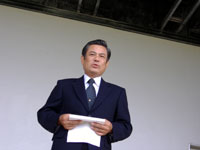
Hello. My name is Maeda Seigi, and I am the mayor of Izena Village. I'm glad to meet all of you. The sea was very rough yesterday, and you must be very tired from your trip to the island. I'd like to give you a warm welcome to Izena.
It is said that this island was first inhabited approximately 3,000 years ago. Many axes and knives made from stone, as well as human bones and pottery from that period have been discovered.
There were five lineages during about 692 years, from 1187 to 1879. Among them, the second Shoen clan ruled the kingdom from 1470 to 1879. I hope you will have a chance to see the many important cultural artifacts that remain on this island where King Shoen was born.
I think you took a look around with Bokunen-san earlier,
and there is one place on this island where you can communicate with the
gods. It is called Akara Utaki (sacred place). Near Akara Utaki,
there are umi gitara and agi gitara, which are boulders
that look as if they are piercing the sky. The word gitara is said to come
from ancient India.
The major industries of the island are agriculture, fishing, and commerce, and these three industries support the island's economy. Our island ranks third in farmed mozuku seaweed production in all of Okinawa prefecture.
Total income of village residents is 3.47 billion
yen, which comes out to 1.78 million yen per villager. That's about average
for Okinawa.
The island covers an area of 15.42 square kilometers and its
circumference is 16 km. We have a population of 1,860 people. We have one
elementary school and one junior high school, with 151 elementary school
students and 71 junior high school students, bringing the total to 222
students. Each homeroom has about 25 students, which is a fairly small
number.
The scope of our lives and economy on the island is limited, and we often feel these limits in the development of agriculture, fishing, and commerce. Because of this, I believe that it is important to increase consumption through the active development of local specialties such as agricultural products and seafood that appeal to consumers.
To accomplish that, I'd like to develop the tourism industry further to provide opportunities for people to come to the island, communicate with the people here, and learn more about the place. I believe that tourism is learning about the unique local history and landscape as well as appreciating the people's warmth.
With this thinking as our foundation, on May 15, 2003 we declared Izena Village a "tourism village," and appointed renowned local artist Naka Bokunen to be our first tourism ambassador. Bokunen-san has been working very hard, and we are very grateful to him.
The most important thing in developing tourism is treasuring the natural landscape of the island and figuring out how to preserve it. We will continue putting our heads and efforts together towards this goal.
With the aim of getting island residents and visitors alike to value, protect, and be advocates of the island's natural beauty, we adopted the Izena Village Environmental Cooperation Tax (a fee of 100 yen for each entry to the island), a first of its kind in Japan. It's almost been a year since the policy was implemented, but thanks to the understanding and cooperation of residents and visitors, awareness of the importance of maintaining a clean environment has been spreading, and the village has become increasingly clean. In the future, we hope to beautify the entire island with flower beds, filling the island with greenery and flowers, while promoting our agriculture, fishing, and commerce industries in order to make the island rich, warm, bright, and comfortable.
Since you and your generation will be the leaders of the twenty-first century,
I hope that you will broaden your understanding of the world through observing
things for yourselves and accumulating various kinds of experiences. I truly
hope that through your experiences you will grow stronger, and become people
who treasure themselves as well as those around them and do your best to
contribute to society. At the same time, I hope that this project will prove
fruitful and memorable to all of you. Thank you.
No reproduction without permission